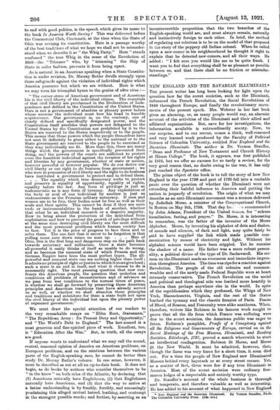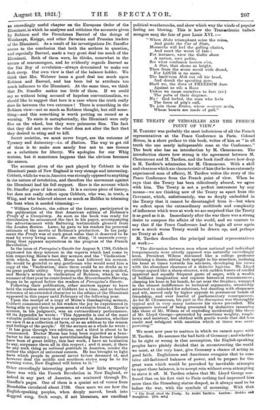NEW ENGLAND AND THE BAVARIAN ILLUMINATI.* Tax present writer has
long been looking for light upon the question how far the secret societies, such as the Illuminati, influenced the French Revolution, the Social Revolutions of 1848 throughout Europe, and finally the revolutionary move- ments of the present epoch. Mrs. Webster in her last book gives an alarming, or, as many people would say, an alarmist account of the activities of the Illuminati and their allied and affiliated organizations. But, save for her investigations, the information available is extraordinarily scanty. Now, to our surprise, and to our rescue, comes a thick, well-reasoned and very learned work produced by the Faculty of Political Science of Columbia University, entitled New England and the Bavarian Illuminati. The author is Dr. Vernon Stauffer, " Dean and Professor of New Testament and Church History at Hiram College." The book, it appears, was first published in 1918, but we offer no excuses for so tardy a review, for the very good reason that, no doubt owing to the war, it has only just reached the Spectator office.
The prime object of the book is to tell the story of how New England in the year 1798 and part of 1799 fell into a veritable panic over the question of whether the Illuminati were not extending their baleful influence to America and putting the nation in jeopardy of revolution. The origin of what we may describe as an anti-Illuminati movement was a sermon delivered by Jedediah Morse, a minister of the Congregational Church, in Boston on May 9th, 1798. That day ha.. n recommended by John Adams, President of the United btaiks, for " solemn humiliation, fasting, and prayer." Dr. Morse, it is interesting to remember, was the father of the inventor of the Morse Alphabet. Morse, by inventing his alphabet of dots and dashes, of sounds and silences, of dark and light, may quite fairly be said to have supplied the link which made possible com- munication by means of electricity and light. Without his alphabet science would have been crippled. Yet he remains the shadow of a name. His father was a more robust person- ality, a political divine of the type of Dr. Sacheverell. His ser- mon on the Illuminati made an enormous and immediate impres- sion throughout America. The time was ripe for a reaction against Revolution. The people of the old colonies and common- wealths and of the newly made Federal Republic) were at heart intensely conservative. The French Revolution on the social and political and theological side was loathed more heartily in America than perhaps anywhere else in the world. In spite of the republicanism which they professed, the Whigs of New York, Massachusetts, Virginia, and the rest of the States loathed the tyranny and the chaotic frenzies of Paris. Feasts of Blood, of Reason, and Fraternity were alike anathema. When, therefore, writers like Robison in his famous work sought to prove that all the ills from which France was suffering were due to the secret societies, the American public was eager to listen. Robison's pamphlet, Proofs of a Conspiracy against all the Religions and Governments of Europe, carried on in the Secret Meetings of the Free Masons, Illuminati, and Reading Societies, Edinburgh, 1797, proved a match wherewith to start an intellectual conflagration. Robison lit Morse, and Morse lit the New World. It must he admitted, however, that, though the flame was very fierce for a short time, it soon died out. For a time the people of New England saw Illuminated Masons behind every haystack or at every street corner. Yet, as a matter of fact, there were few if any true Illuminati in America. Most of the secret aocieties were ordinary free- mason lodges of a respectable and entirely worthy type.
Dr. Stauffer's account of the whole business is thorough and temperate, and therefore valuable as well as interesting. He has added to his account of what happened in New England
• New Englund and as Bavarian Illuminate. By Vernon Stauffer. PhD. The Columbia University Press. WAIL not.] an exceedingly useful chapter on the European Order of the Illuminati, in which he analyses and criticizes the accounts given by Robison and the Frenchman Barruel of the doings of weighaupt, Knigge, and other Bavarian and Prussian leaders of. the Illuminati. As a result of his investigations Dr. Stauffer comes to the conclusion that both the authors in question, and especially Barruel, made a very great deal too much of the Illuminati. Both of them were, he thinks, somewhat in the nature of scaremongers, and he evidently regards Barruel as the Fat Boy of revolution—always determined to make our flesh creep. Our own view is that of the balance holder. We think that Mrs. Webster leans a good deal too much upon Robison and Bernie', and has been led to attribute too much influence to the Illuminati. At the same time, we think that Dr. Stauffer makes too little of them. If we could say so without being accused of hopeless conventionalism, we should like to suggest that here is a case where the truth really does lie between the two extremes I There is something in the Robison view—not so much as Robison thought, but still some- thing—and this something is worth putting on record as a warning. To state it metaphorically, the Illuminati were only flies on the wheel, but they were poisonous flies. The fact that they did not move the wheel does not alter the fact that they desired to sting and to kill.
Secret societies, we must never forget, are the outcome of Tyranny and Autocracy—i.e. of Etatisrn. The way to get rid of them is to make men sanely free not to use licence as a substitute for liberty. We apologize for our Whig truisms, but it sometimes happens that the obvious becomes the unseen.
The account given of the part played by Cobbett in the Illuminati panic of New England is very strange and interesting. Cobbett, while he was in America was strongly opposed to anything in the nature of revolution, and therefore the movement against the illuminati had his full support. Here is the account which Dr. Stauffer gives of his action. It is a curious piece of history, but does not really reflect upon Cobbett, who was, in truth, a Whig, and who believed almost as much as Halifax in trimming the boat when it needed trimming:— " William Cobbett, the editor of the former, participated in thepublication of the first American edition of Robison's Proofs of a Conspiracy. As soon as the book was ready for distribution he announced the fact in his paper, accompanying the advertisement with flattering testimonials gleaned from the London Review. Later, he gave to his readers his personal estimate of the merits of Robison's production. In his judg- ment the Proofs was of such great value that it deserved to be read by every living man. For one thing, it unravels every- thing that appears mysterious in the progress of the French Revolution.'
In the issue of Porcupine's Gazette for August 9, 1798, Cobbett expressed his deep interest in the reports which had come to him respecting Morse's fast day sermon and the Vindication' with which, he understood, Morse had followed his sermon. He would be grateful to any gentleman who would send him a copy of the Vindication,' since there could be no doubt as to its great public utility. Very promptly his desire was gratified, and Morse's articles in vindication of Robison, which in the summer of that year he contributed to the /if assechusette Mercury, began to be spread before the readers of Porcupine's Gazette. Following their publication, other matters appear to have held the restless attention of Cobbett for a time, and no further reference of an extended character to the affairs of the Illuminati appeared in this paper until February of the following year. Upon the receipt of a copy of Morse's thanksgiving sermon, Cobbett communicated to his readers the joy he experienced in being able to put them in possession of extracts from it. Morse's sermon, in his judgment, was an extraordinary performance. Of its Appendix he wrote : ' This Appendix is one of the most valuable political tracts that ever appeared in America, whether we view it as a collection of facts, or as an address to the reason and feelings of the people.' Of the sermon as a whole he wrote : It has gone through two editions, and a third is about to be commenced. Doctor Morse has long been regarded as a bene- factor to his country ; but notwithstanding his former labours have been of great utility, this last work, I have no hesitation to say, surpasses them all in this respect ; and it must, if there be any such thing as national gratitude in America, render the author the object of universal esteem. He has brought to light facts which people in general never before dreamed of, and however deaf the middle and southern states may be to his warning voice, Now England will listen to it."'
Other exceedingly interesting proofs of how little sympathy there was with the French Revolution in New England, or Indeed in any part of America, are scattered through Dr. Stauffer's pages. One of them is a quaint set of verses from Broadsides circulated about 1798. Once more we see how the English-speaking peoples, when deeply moved, break into doggerel song. Such songs, if not literature, are excellent political wea.thercooks, and show which way the winds of popular feeling are blowing. This is how the Tranaatlantio ballad• mongers sang the fate of poor Louis XVL :—
" When Moba triumphant seize the reins, And guide the Car of State,
Monarchs will feel the galling chains, And meet the worst of fate :
For instance, view the Gallic shore A nation, once polite, See what confusion hovers o'er, A Star, that shone so bright.
Then from the scene recoil with dread, For LOUIS is no more,
The barb'rous Mob cut off his head, And drank tho spouting gore. Shall we, the Sons of FREEDOM dare Against so vile a Race Unless we mean ourselves to bare (sic) The palm of their disgrace.
No ! God forbid, the man who feels The force of pity's call,
To join those Brutes, whose sentence seals,
Whose hearts are made of gall."



































 Previous page
Previous page